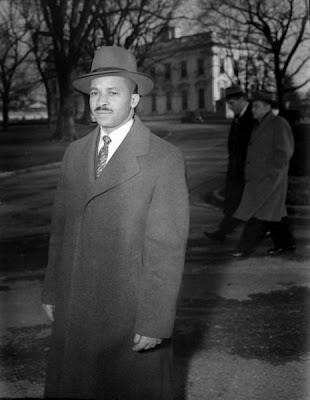
Harry McAlpin
(1906-1985)
Harry McAlpin was a trailblazing journalist who broke racial barriers as the first African American reporter to attend a White House press conference. His unwavering commitment to journalism and equality exemplified the power of breaking down barriers and opening doors for future generations.
Harry McAlpin, the pioneering African American journalist, passed away on October 22, 1985, in his hometown of Louisville, Kentucky, at the age of 79. His death marked the end of a remarkable career and a life dedicated to breaking racial barriers in journalism and promoting equality.
During his career, McAlpin faced significant challenges as one of the few African Americans working in the predominantly white field of journalism. His most notable achievement was becoming the first Black reporter to attend a White House press conference, which occurred during President Franklin D. Roosevelt’s administration in 1944. This milestone was a significant step toward greater inclusivity in the press corps.
McAlpin’s dedication to journalism and the fight against racial discrimination continued throughout his life. He remained committed to advocating for civil rights and equality in the media, setting an example for future generations of African American journalists.
While Harry McAlpin’s passing marked the end of his physical presence, his legacy as a trailblazing journalist and advocate for equality lives on. He remains an important figure in the history of American journalism and the ongoing struggle for civil rights and representation in the media.

J.M. Eddins, Jr./MCT/Landov
Harry McAlpin’s Legacy:
Harry McAlpin left an enduring legacy as a trailblazing African American journalist who broke down racial barriers and fought for greater inclusivity in the media. His remarkable career and contributions continue to resonate:
Breaking Racial Barriers: McAlpin’s most notable achievement was becoming the first African American reporter to attend a White House press conference during President Franklin D. Roosevelt’s administration in 1944. This groundbreaking moment shattered racial segregation in the White House press corps, paving the way for greater diversity in journalism.
Advocate for Equality: Throughout his career, McAlpin used his platform to advocate for civil rights and racial equality. He believed that journalism had a critical role to play in challenging prejudice and promoting social justice.
Inspiration for Future Journalists: McAlpin’s pioneering spirit and determination continue to inspire aspiring journalists, particularly those from underrepresented backgrounds. His legacy serves as a reminder of the importance of diversity and inclusion in the media.
Historical Significance: McAlpin’s contributions are an integral part of the broader history of African Americans’ struggle for civil rights and representation in American society. His work highlights the impact that individuals can have in breaking down systemic barriers.
Journalistic Excellence: Beyond his role as a racial trailblazer, McAlpin was known for his dedication to quality journalism. His commitment to accurate reporting and professionalism set a high standard for all journalists.
Symbol of Progress: Harry McAlpin’s life and career symbolize the progress made in the field of journalism and the ongoing need for diversity and inclusivity in media organizations. His legacy underscores the importance of diverse voices in shaping the narratives that inform and influence society.
In summary, Harry McAlpin’s legacy is one of courage, determination, and advocacy for racial equality within the journalism profession. His groundbreaking achievements continue to inspire journalists and advocates for civil rights, reminding us of the ongoing struggle for inclusivity and social justice in the media and society at l
